Unit 6 When was it invented Section A 3a-4c课件(共60张PPT) 人教版英语九年级全册
文档属性
| 名称 | Unit 6 When was it invented Section A 3a-4c课件(共60张PPT) 人教版英语九年级全册 | 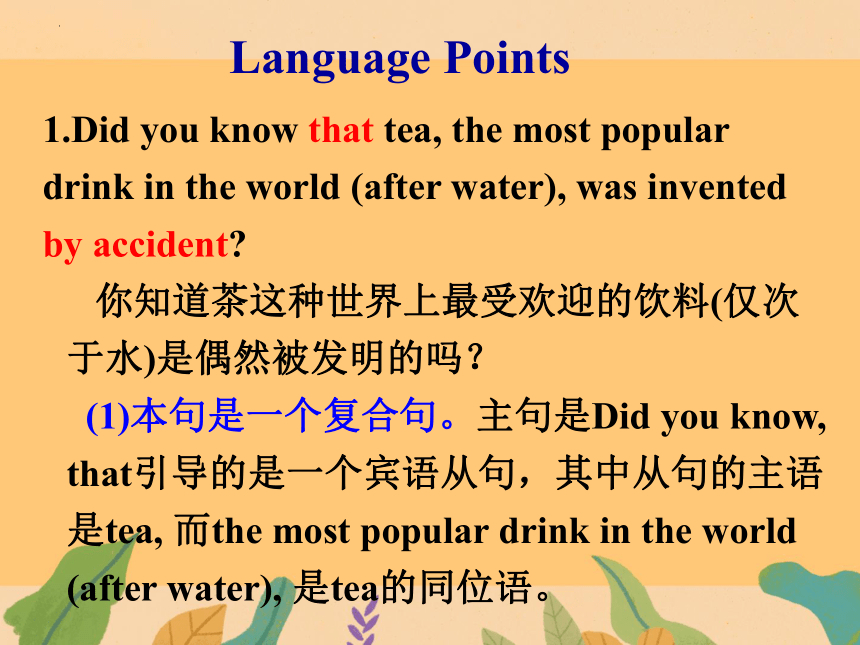 | |
| 格式 | pptx | ||
| 文件大小 | 7.3MB | ||
| 资源类型 | 教案 | ||
| 版本资源 | 人教新目标(Go for it)版 | ||
| 科目 | 英语 | ||
| 更新时间 | 2024-09-22 07:35:05 | ||
图片预览

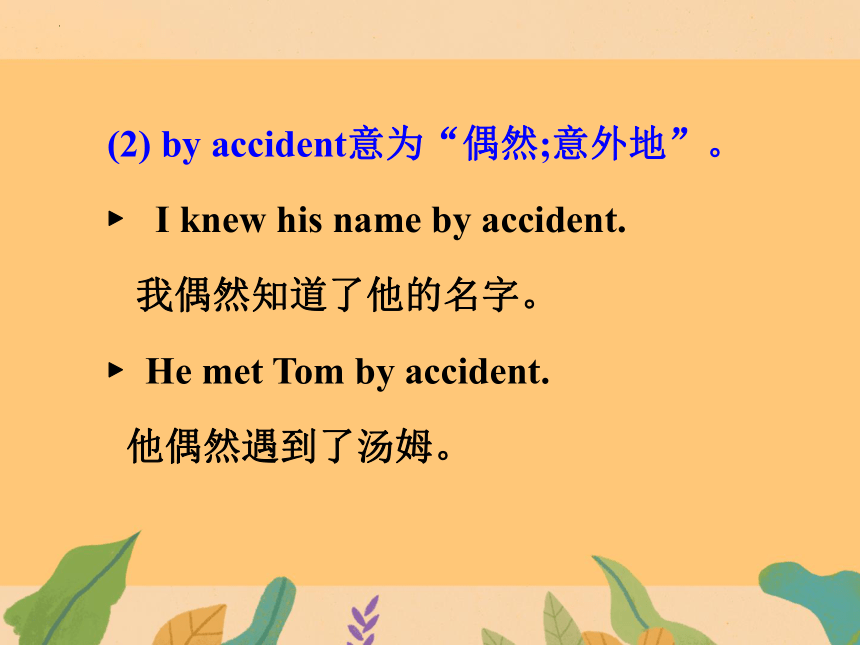
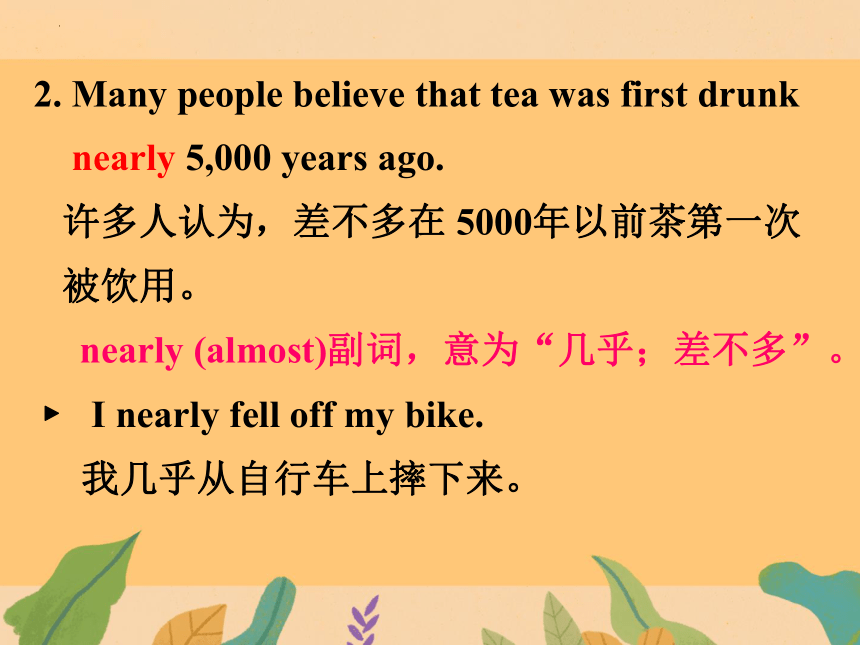
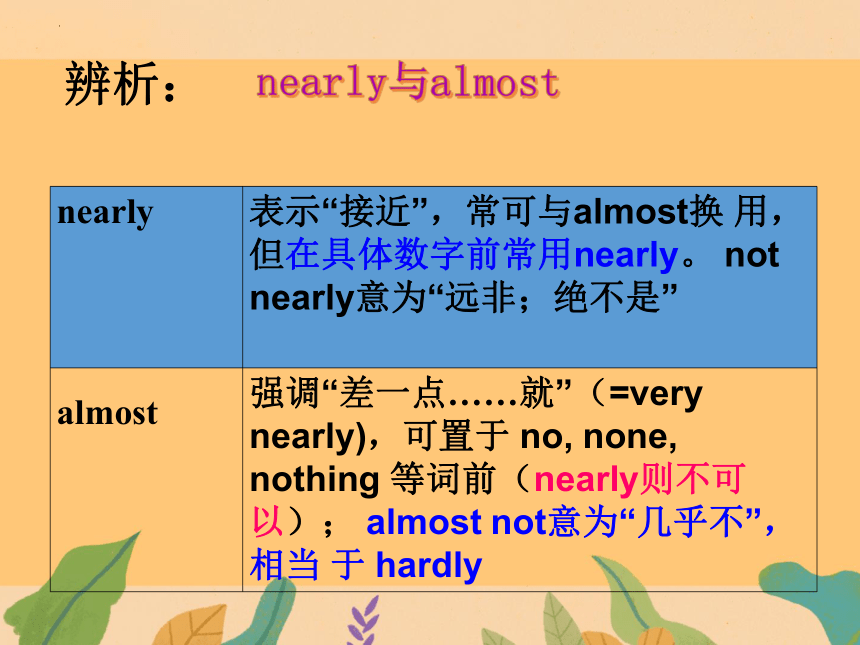
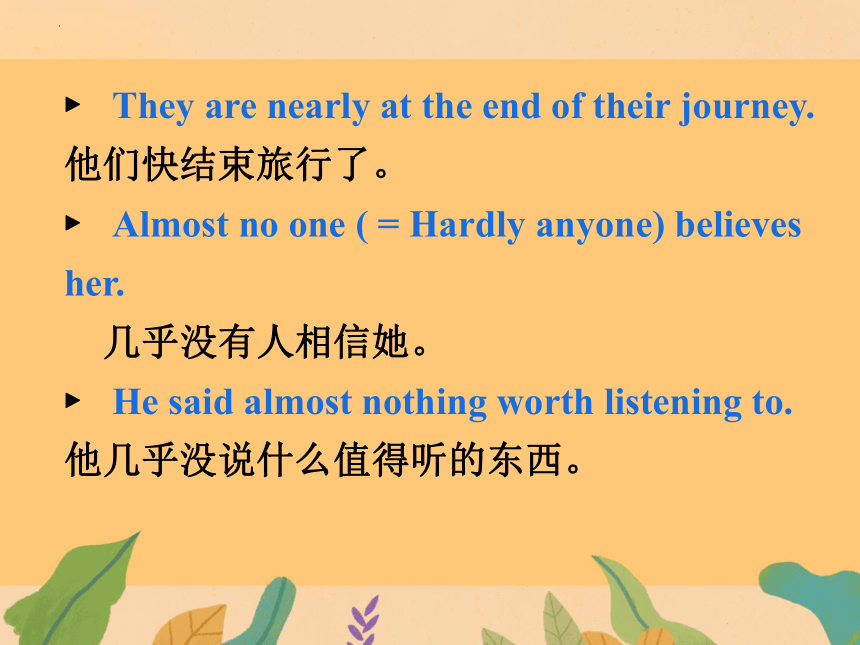
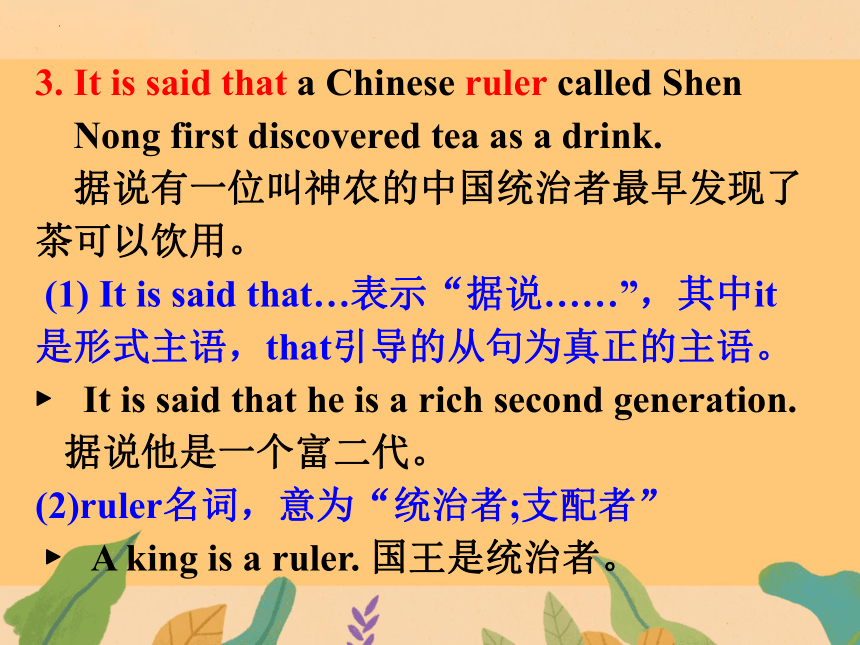


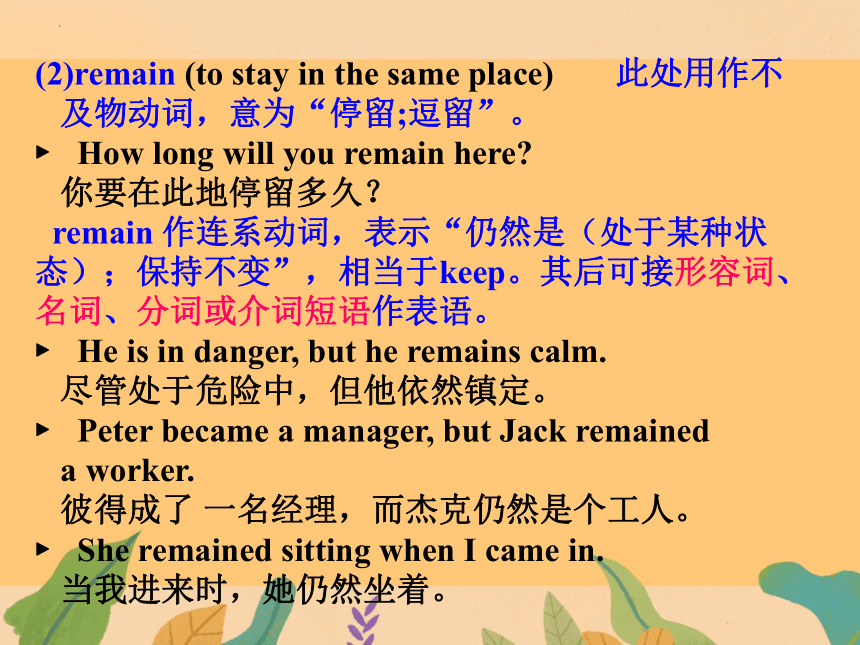
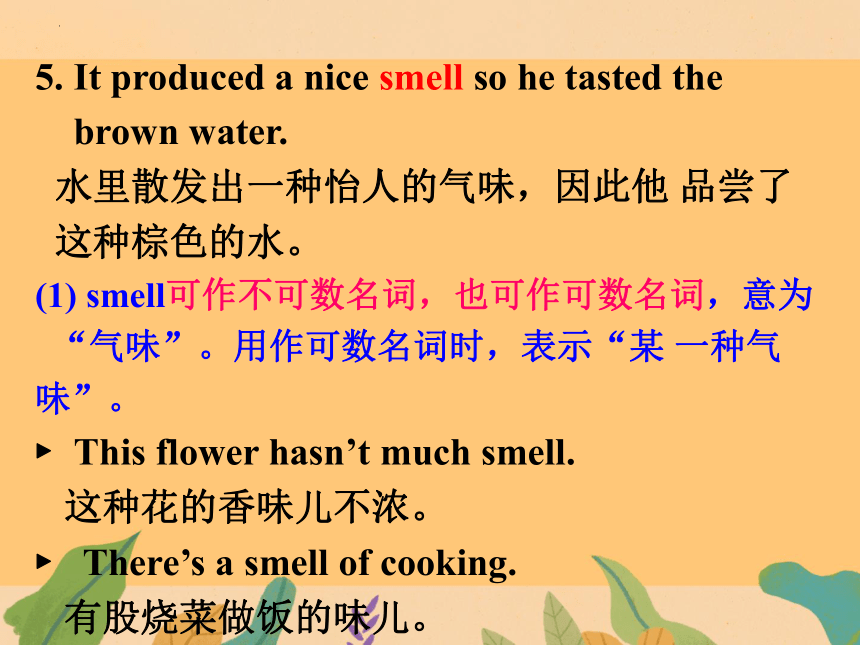
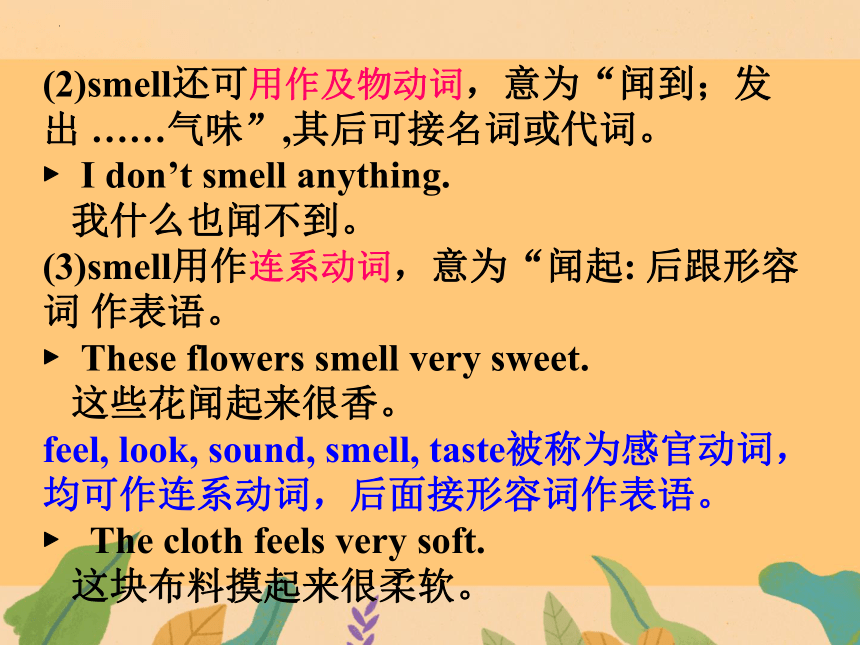
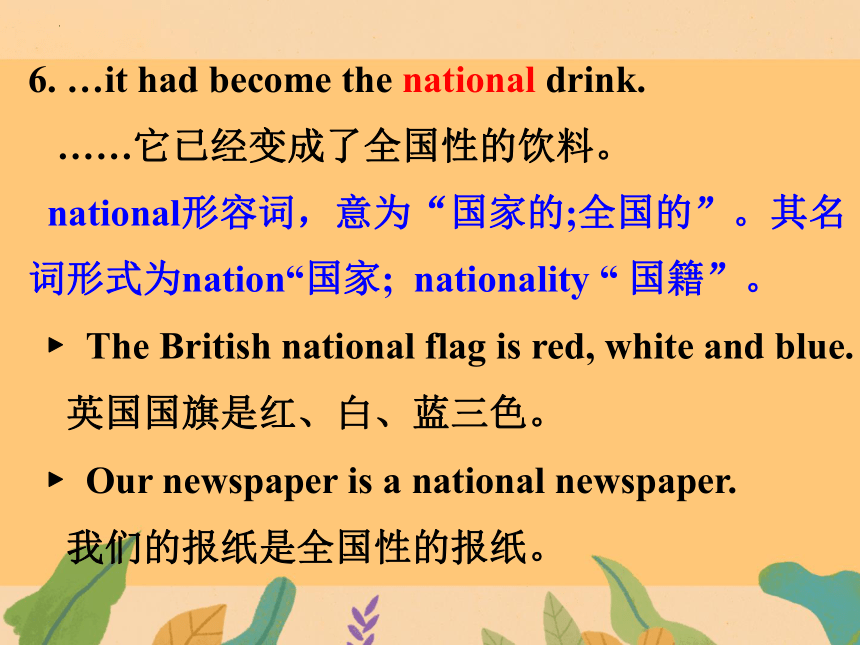
文档简介
(共60张PPT)
Did you know that tea, the most popular drink in the world (after water), was invented by accident
你知道茶这种世界上最受欢迎的饮料(仅次于水)是偶然被发明的吗?
(1)本句是一个复合句。主句是Did you know, that引导的是一个宾语从句,其中从句的主语是tea, 而the most popular drink in the world (after water), 是tea的同位语。
Language Points
(2) by accident意为“偶然;意外地”。
I knew his name by accident.
我偶然知道了他的名字。
He met Tom by accident.
他偶然遇到了汤姆。
2. Many people believe that tea was first drunk
nearly 5,000 years ago.
许多人认为,差不多在 5000年以前茶第一次
被饮用。
nearly (almost)副词,意为“几乎;差不多”。
I nearly fell off my bike.
我几乎从自行车上摔下来。
nearly 表示“接近”,常可与almost换 用,但在具体数字前常用nearly。 not nearly意为“远非;绝不是”
almost 强调“差一点……就”(=very nearly),可置于 no, none, nothing 等词前(nearly则不可以); almost not意为“几乎不”,相当 于 hardly
nearly与almost
辨析:
They are nearly at the end of their journey. 他们快结束旅行了。
Almost no one ( = Hardly anyone) believes her.
几乎没有人相信她。
He said almost nothing worth listening to. 他几乎没说什么值得听的东西。
3. It is said that a Chinese ruler called Shen
Nong first discovered tea as a drink.
据说有一位叫神农的中国统治者最早发现了 茶可以饮用。
(1) It is said that…表示“据说……”,其中it 是形式主语,that引导的从句为真正的主语。
It is said that he is a rich second generation.
据说他是一个富二代。
(2)ruler名词,意为“统治者;支配者”
A king is a ruler. 国王是统治者。
其他常见“It is ...that”句式
拓展:
4. Some leaves from a tea plant fell into the water and remained there for some time.
一株茶树上的几片叶子落到水里并停留了了一段时间。
(l) fall into意为“落人;掉入”。
He was drunk and fell into the water.
他喝醉了,跌落到水中。
fall asleep 入睡 fall down倒下;落下
fall in love with 与......相爱 fall over被......绰倒
fall off跌落;从......掉下来
与fall相关的其他短语:
拓展:
(2)remain (to stay in the same place) 此处用作不
及物动词,意为“停留;逗留”。
How long will you remain here
你要在此地停留多久?
remain 作连系动词,表示“仍然是(处于某种状态);保持不变”,相当于keep。其后可接形容词、名词、分词或介词短语作表语。
He is in danger, but he remains calm.
尽管处于危险中,但他依然镇定。
Peter became a manager, but Jack remained
a worker.
彼得成了 一名经理,而杰克仍然是个工人。
She remained sitting when I came in.
当我进来时,她仍然坐着。
5. It produced a nice smell so he tasted the
brown water.
水里散发出一种怡人的气味,因此他 品尝了
这种棕色的水。
(1) smell可作不可数名词,也可作可数名词,意为
“气味”。用作可数名词时,表示“某 一种气味”。
This flower hasn’t much smell.
这种花的香味儿不浓。
There’s a smell of cooking.
有股烧菜做饭的味儿。
(2)smell还可用作及物动词,意为“闻到;发出 ……气味”,其后可接名词或代词。
I don’t smell anything.
我什么也闻不到。
(3)smell用作连系动词,意为“闻起: 后跟形容 词 作表语。
These flowers smell very sweet.
这些花闻起来很香。
feel, look, sound, smell, taste被称为感官动词,均可作连系动词,后面接形容词作表语。
The cloth feels very soft.
这块布料摸起来很柔软。
6. …it had become the national drink.
……它已经变成了全国性的饮料。
national形容词,意为“国家的;全国的”。其名词形式为nation“国家; nationality “ 国籍”。
The British national flag is red, white and blue.
英国国旗是红、白、蓝三色。
Our newspaper is a national newspaper.
我们的报纸是全国性的报纸。
7. The tea trade from China to Western
countries took place in the 19th century.
中国和西方国家之间的茶叶贸易发生在19 世纪。
take place意为“发生;出现”。
Great changes have taken place since 1976.
自1976年以来发生了巨大的变化,
Unit 6
When was it invented
Section A (3a-4c)
学习目标
Key words & phrases:
by accident, ruler, boil, remain, smell, saint,
national, take place, doubt, without doubt, fridge,
low, somebody, translate, lock, earthquake, sudden,
all of a sudden, biscuit, cookie, instrument
Key sentences:
1.—When was tea brought to Korea
— It was brought to Korea during
the 6th and 7th centuries.
Learn some Reading Skills
take place 表示必然性的“发生”或 指根据计划或安排“举行”的. 无被动语态
happen 表示偶然性的没预料到的 “发生”,无被动语态
take place与happen
辨析:
The opening of the play will take place tomorrow night
这部剧将于明晚进行首演。
The car accident happened last week
这起车祸发生在上周。
8. Even though many people now know about tea culture, the Chinese are without doubt the ones
who best understand the nature of tea.
尽管现在许多人了解茶文化,但是中国人无疑 是最懂茶的内涵的人。
(1)这是一个多重复合句。even though引导让步
状语从句。主句中含有一个定语从句 who
best understand the nature of tea,修饰前面
的先行词ones。
(2) doubt (a feeling of being uncertain about sth.)
名词,意为“疑惑;疑问”,
without doubt 意为 “毫无疑问;的确”。
If there is any doubt, you had better make
certain.
如果有什么疑问,你最好弄清楚。
Without doubt she has been working hard.
她的确一直在努力工作。
doubt作动词,意为“怀疑;不相信”,其后 可直接跟名词或代词作宾语。
I have no reason to doubt him.
我没有理由怀疑他。
无论doubt用作名词还是动词,在肯定句中其后常接whether从句,在否定句和疑问句中常接that从句。
We doubt whether he will come.
我们怀疑他是否会来。
There is no doubt that our experiment will
succeed.
毫无疑问我们的实验会成功。
Let’s enjoy a video.
It’s about the tea culture in China.
Lu Yu.
2. Who is the writer of Cha Jing
1. What is the video about
Answer the questions according to the video.
What’s the most traditional drink in China
Tea has a long history.
Tea was first drunk nearly
5, 000 years ago.
boiling drinking water
leaves
It smells pleasant.
It tastes delicious and …
Pre-reading
Who was tea invented by
It was invented by the Chinese ruler called Shen Nong.
Shen Nong
How was it invented
boiling water over an open fire
fell into …and remained…
produced a nice smell
tasted the brown water —tea
It was invented by accident.
Read the passage quickly and match each paragraph with its main idea.
Para. 1
Para. 2
Para. 3
Lu Yu and his book Cha Jing
How tea spread to other countries
How tea was invented by accident
偶然;意外地
While-reading
3a
3. Who is called “the saint of tea”
___________________________________
Read the passage again and answer the questions.
1. When was tea first drunk
___________________________________
2. How was tea invented
___________________________________
It was first drunk about 5,000 years ago.
It was invented by accident.
Lu Yu.
n. 圣人,圣徒
3b
4. What is Cha Jing about
____________________________________
____________________________________
____________________________________
____________________________________
____________________________________
____________________________________
____________________________________
The book describes how tea plants were grown and used to make tea. It also discusses where the finest tea leaves were produced and what kinds of water were used.
Tea was brought to Korea and Japan during the 6th and 7th centuries. It was
brought to England at around 1660.
5.When was tea brought to other countries
Fill in the blanks with the proper forms according to the first paragraph.
Tea (after water), the most popular drink in the world ___________ (invent) by accident. It is believed that tea _________ (drink) 5,000 years ago. It ______ (say) that a Chinese ruler ______ (call) Shen Nong was the first _______ (discover) tea
as a drink.
was invented
was drunk
Post-reading
is said
called
to discover
One day Shen Nong __________ (boil) drinking water over an open fire. Some leaves from a tea plant ____ (fall) into the water and remained there for some time. It ________ (produce) a nice smell so he ______ (taste) the brown water. It was quite delicious, and so, one of the world’s favorite drinks ____________ (invent).
was boiling
fell
produced
tasted
was invented
Fill in the blanks with the proper forms according to the second paragraph.
Lu Yu, “the saint of tea”, ____________ (mention) Shen Nong in his book Cha Jing a few thousand years later. The book describes how tea plants ___________ and used to make tea. It also discusses where the finest tea leaves ______________ (produce) and what kinds of water _________ (use).
mentioned
were grown
were produced
were used
Fill in the blanks with the proper forms according to the third paragraph.
People believed that tea _____________ (bring) to Korea and Japan during the 6th and 7th centuries. In England, tea _____________ (not appear) until around 1660, but in less than 100 years, it had become the national drink. The tea trade from China to Western countries ______ (take) place in the 19th century.
was brought
didn’t appear
took
This ________ (help) to spread the popularity of tea and the tea plant to more places around the world. Even though many people now know about tea culture, the Chinese ____ (be)
without doubt the ones who best __________
(understand) the nature of tea.
helped
are
understand
毫无疑问;的确
1. One of the world’s favorite drinks was _________ by accident.
2. Tea was first ________ by Shen Nong about 5,000 years ago.
Complete the sentences with the correct forms of the verbs in the box.
invent, drink, bring, produce, trade
invented
drunk
3c
3. A nice smell was _________ when the tea leaves dropped into the hot water.
4. Tea was ________ to Korea and Japan during the 6th and 7th centuries.
5. Tea is now ______ between many different countries.
traded
produced
brought
invent, drink, bring, produce, trade
根据课本内容,完成下列句子。
1. 拉链是什么时候被发明的?
______ _____ the zipper ________
2. 它于1893年被发明。
It ______ _________ in 1893.
was invented
When was invented
Grammar Focus
3. 它是由谁发明的?
______ _____ it invented ______
4. 它是由惠特科姆 贾得森发明的。
It ____ ________ ___ Whitcomb Judson.
5. 茶叶什么时候被带到朝鲜去的?
_____ ______ tea _________ to Korea
was invented by
When was brought
Who was by
6. 是在六到七世纪之间被带到朝鲜。
It _____ _______ to Korea ________the 6th and 7th centuries.
7. 热冰淇淋勺用来做什么?
What ___ the hot ice-cream scoop
_____ _____
8. 它用来挖很冷的冰淇淋。
It’s _____ ____ ______ really cold
ice-cream.
used for serving
is
used for
was brought during
9. 贝尔于1876年发明了电话机。
Alexander Graham Bell _________ the telephone in 1876.
10. 电话机在1876年被贝尔所发明。
The telephone _____ ________ _____
Alexander Graham Bell in 1876.
invented
was invented by
Grammar
英语有两种语态:主动语态和被动语态。主动语态表示主语是动作的执行者,而被动语态则表示主语是动作的承受者。如:
We cleaned the classroom yesterday.
我们昨天打扫了教室。
(主动语态,主语we是clean这一动作的执行者)The classroom was cleaned yesterday.
教室昨天被打扫。
(被动语态,主语the classroom是clean这一动作的承受者)
一般过去时被动语态的结构为“主语+ was /were +及物动词的过去分词(+by+动作的执行者).”。如:
Trees were planted last spring.
去年春天种了树。
一、一般过去时被动语态
1. 肯定句:
主语+was / were+及物动词的过去分词+其他.
e.g. Paper was invented by Chinese people two thousand years ago.
纸是中国人在二千多年前发明的。
2. 否定句:
主语+ was/were not+及物动词的过去分词+其他.
e.g. Women were not allowed to take part in the games at first.
开始妇女不允许参加奥运会。
3. 一般疑问句:
Was/Were +主语 +及物动词的过去分词+其他
e.g. Was this picture drawn by your sister
这幅画是你妹妹画的吗?
1. 不知道谁是动作的执行者,或没有必要指出谁是动作的执行者。
e.g. English is spoken all over the world.
全世界都在说英语。
2. 需要突出或强调动作的承受者。
e.g. This dictionary is used by most students.
这本字典是大多数学生在用的。
二、被动语态的用法:
1. 有些短语动词相当于及物动词,变为被动句时介词或副词不能去掉。
e.g. They put off the meeting because of the weather.
→ The meeting was put off because of the weather.
会议因天气的缘故被推迟了。
三、主动语态变被动语态应注意的问题
2. 含有双宾语的主动句变为被动句时,通常把指“人”的间接宾语变为主语,指“物”的直接宾语保留不变;如果把指“物”的直接宾语变为主语,则在间接语前加to或for。
e.g. My aunt gave me an e-dictionary yesterday.
I was given an e-dictionary yesterday.
An e-dictionary was given to me
yesterday.
3. 主动句中感官动词see / hear / watch / feel等和使役动词make / let / have等后跟省略to的动词不定式,变为被动语态时应加上不定式标志to。
e.g. I saw a heavy man enter the house.
A heavy man was seen to enter the house.
4. 系动词、不及物动词或某些短语动词(happen, take place, come true, fall asleep…)没有被动语态。
e.g. What happened to Mr. Brown 布朗先生发生了什么事?
将下列句子变为被动语态。
1. He chose six story books the other day.
Six story books _____ _______ by him the other day.
2. Uncle Lee gave Jack a large cake for he painted the wall wonderfully.
Jack _____ _____ a large cake for he painted
the wall wonderfully.
was given
were chosen
Exercises
3. A mouse ate half of the cake last night.
Half of the cake _____ _____ by a mouse last night.
was eaten
将下列句子变为主动语态。
4. Were these machines invented by Edison
_____ Edison _______ these machines
Did invent
5. The post card was sent to Linda by Paul.
Paul _____ the post card ___ Linda.
6. America was discovered by Columbus.
Columbus __________ America.
sent to
discovered
对划线部分提问
7. Shoes with lights were used for seeing in the dark.
_____ ______ shoes with lights ______ for?
8. Paper was invented in China almost a thousand years ago.
______ _____ paper _________ in China
used
What were
When was invented
Rewrite the sentences using the passive voice.
【点拨】原句为一般过去时态,原句的谓语动词为sold,宾语为the fridge;改为被动语态时,应将the fridge作主语,谓语动词用was sold的形式。
1. They sold the fridge at a low price.
The fridge was sold at a low price.
4a
【点拨】分析原句的句子结构可知,stole是谓语动词,my camera是句子的宾语;改为被动语态句时,应将my camera作句子主语,谓语动词用was stolen的形式。
2. Somebody stole my camera
from my hotel room.
_________________________________
_________________________________
My camera was stolen from my hotel room.
3. Where did you take these photos
__________________________________
4. Our parents advised us not to go out alone.
__________________________________
—————————————————
5. Different writers translated the book into different languages.
__________________________________
__________________________________
Where were these photos taken
We were advised not to go out alone by our parents.
The book was translated into different languages by different writers.
1. You ____________ to the party last night, weren’t you Why didn’t you go
2. The earthquake happened all of a sudden,
but luckily the villagers _____________ to a
safe place.
were invited
eat, like, invite, tell, lock, ring, break, bring
were brought
Complete the sentences with correct forms of the verbs in the box.
句子主语you与invite之间存在被动关系。
villagers与bring之间存在被动关系
4b
3. The door ___________ when we arrived, so we ______ the bell.
4. The students ___________ not to eat ordrink in class, but Ruby ______ the rule when she started eating a biscuit in science class.
5. The cookies __________ by the hungry kids in less than 20 minutes, and they really _____ them.
was locked
rang
broke
were told
were eaten
liked
the door与lock之间为被动关系;而we与ring之间则为主动关系;其他各题相同。
The telephone ______________ (invent) by Alexander Graham Bell. He __________ (born) in 1847. Mr. Bell ________ (work) on the invention of the telephone with Thomas Watson.
was born
was invented
worked
Decide whether active or passive forms should be used in these sentences. Write the correct forms in the blanks.
the telephone与invent之间存在被动关系;Mr. Bell与work之间是主动关系。
4c
In 1875, Mr. Bell _________ (learn) how to send musical notes through an instrument similar to a telephone. Finally, the telephone _____________ (invent) in 1876. The first sentence that _________ (say) on the telephone by Mr. Bell was “Mr. Watson, come here; I want to see you.” Today the telephone ________ (use) around the world.
learned
was invented
was said
is used
Mr. Bell与learn之间为主动关系。
Summary
Learned the story of the invention of tea.
Learned the Active Voice and the Passive Voice (past tense).
Homework
Memorize the points in 3a.
Retell the story of the invention of tea.
Do the exercises in students’ book.
Thank you!
Did you know that tea, the most popular drink in the world (after water), was invented by accident
你知道茶这种世界上最受欢迎的饮料(仅次于水)是偶然被发明的吗?
(1)本句是一个复合句。主句是Did you know, that引导的是一个宾语从句,其中从句的主语是tea, 而the most popular drink in the world (after water), 是tea的同位语。
Language Points
(2) by accident意为“偶然;意外地”。
I knew his name by accident.
我偶然知道了他的名字。
He met Tom by accident.
他偶然遇到了汤姆。
2. Many people believe that tea was first drunk
nearly 5,000 years ago.
许多人认为,差不多在 5000年以前茶第一次
被饮用。
nearly (almost)副词,意为“几乎;差不多”。
I nearly fell off my bike.
我几乎从自行车上摔下来。
nearly 表示“接近”,常可与almost换 用,但在具体数字前常用nearly。 not nearly意为“远非;绝不是”
almost 强调“差一点……就”(=very nearly),可置于 no, none, nothing 等词前(nearly则不可以); almost not意为“几乎不”,相当 于 hardly
nearly与almost
辨析:
They are nearly at the end of their journey. 他们快结束旅行了。
Almost no one ( = Hardly anyone) believes her.
几乎没有人相信她。
He said almost nothing worth listening to. 他几乎没说什么值得听的东西。
3. It is said that a Chinese ruler called Shen
Nong first discovered tea as a drink.
据说有一位叫神农的中国统治者最早发现了 茶可以饮用。
(1) It is said that…表示“据说……”,其中it 是形式主语,that引导的从句为真正的主语。
It is said that he is a rich second generation.
据说他是一个富二代。
(2)ruler名词,意为“统治者;支配者”
A king is a ruler. 国王是统治者。
其他常见“It is ...that”句式
拓展:
4. Some leaves from a tea plant fell into the water and remained there for some time.
一株茶树上的几片叶子落到水里并停留了了一段时间。
(l) fall into意为“落人;掉入”。
He was drunk and fell into the water.
他喝醉了,跌落到水中。
fall asleep 入睡 fall down倒下;落下
fall in love with 与......相爱 fall over被......绰倒
fall off跌落;从......掉下来
与fall相关的其他短语:
拓展:
(2)remain (to stay in the same place) 此处用作不
及物动词,意为“停留;逗留”。
How long will you remain here
你要在此地停留多久?
remain 作连系动词,表示“仍然是(处于某种状态);保持不变”,相当于keep。其后可接形容词、名词、分词或介词短语作表语。
He is in danger, but he remains calm.
尽管处于危险中,但他依然镇定。
Peter became a manager, but Jack remained
a worker.
彼得成了 一名经理,而杰克仍然是个工人。
She remained sitting when I came in.
当我进来时,她仍然坐着。
5. It produced a nice smell so he tasted the
brown water.
水里散发出一种怡人的气味,因此他 品尝了
这种棕色的水。
(1) smell可作不可数名词,也可作可数名词,意为
“气味”。用作可数名词时,表示“某 一种气味”。
This flower hasn’t much smell.
这种花的香味儿不浓。
There’s a smell of cooking.
有股烧菜做饭的味儿。
(2)smell还可用作及物动词,意为“闻到;发出 ……气味”,其后可接名词或代词。
I don’t smell anything.
我什么也闻不到。
(3)smell用作连系动词,意为“闻起: 后跟形容 词 作表语。
These flowers smell very sweet.
这些花闻起来很香。
feel, look, sound, smell, taste被称为感官动词,均可作连系动词,后面接形容词作表语。
The cloth feels very soft.
这块布料摸起来很柔软。
6. …it had become the national drink.
……它已经变成了全国性的饮料。
national形容词,意为“国家的;全国的”。其名词形式为nation“国家; nationality “ 国籍”。
The British national flag is red, white and blue.
英国国旗是红、白、蓝三色。
Our newspaper is a national newspaper.
我们的报纸是全国性的报纸。
7. The tea trade from China to Western
countries took place in the 19th century.
中国和西方国家之间的茶叶贸易发生在19 世纪。
take place意为“发生;出现”。
Great changes have taken place since 1976.
自1976年以来发生了巨大的变化,
Unit 6
When was it invented
Section A (3a-4c)
学习目标
Key words & phrases:
by accident, ruler, boil, remain, smell, saint,
national, take place, doubt, without doubt, fridge,
low, somebody, translate, lock, earthquake, sudden,
all of a sudden, biscuit, cookie, instrument
Key sentences:
1.—When was tea brought to Korea
— It was brought to Korea during
the 6th and 7th centuries.
Learn some Reading Skills
take place 表示必然性的“发生”或 指根据计划或安排“举行”的. 无被动语态
happen 表示偶然性的没预料到的 “发生”,无被动语态
take place与happen
辨析:
The opening of the play will take place tomorrow night
这部剧将于明晚进行首演。
The car accident happened last week
这起车祸发生在上周。
8. Even though many people now know about tea culture, the Chinese are without doubt the ones
who best understand the nature of tea.
尽管现在许多人了解茶文化,但是中国人无疑 是最懂茶的内涵的人。
(1)这是一个多重复合句。even though引导让步
状语从句。主句中含有一个定语从句 who
best understand the nature of tea,修饰前面
的先行词ones。
(2) doubt (a feeling of being uncertain about sth.)
名词,意为“疑惑;疑问”,
without doubt 意为 “毫无疑问;的确”。
If there is any doubt, you had better make
certain.
如果有什么疑问,你最好弄清楚。
Without doubt she has been working hard.
她的确一直在努力工作。
doubt作动词,意为“怀疑;不相信”,其后 可直接跟名词或代词作宾语。
I have no reason to doubt him.
我没有理由怀疑他。
无论doubt用作名词还是动词,在肯定句中其后常接whether从句,在否定句和疑问句中常接that从句。
We doubt whether he will come.
我们怀疑他是否会来。
There is no doubt that our experiment will
succeed.
毫无疑问我们的实验会成功。
Let’s enjoy a video.
It’s about the tea culture in China.
Lu Yu.
2. Who is the writer of Cha Jing
1. What is the video about
Answer the questions according to the video.
What’s the most traditional drink in China
Tea has a long history.
Tea was first drunk nearly
5, 000 years ago.
boiling drinking water
leaves
It smells pleasant.
It tastes delicious and …
Pre-reading
Who was tea invented by
It was invented by the Chinese ruler called Shen Nong.
Shen Nong
How was it invented
boiling water over an open fire
fell into …and remained…
produced a nice smell
tasted the brown water —tea
It was invented by accident.
Read the passage quickly and match each paragraph with its main idea.
Para. 1
Para. 2
Para. 3
Lu Yu and his book Cha Jing
How tea spread to other countries
How tea was invented by accident
偶然;意外地
While-reading
3a
3. Who is called “the saint of tea”
___________________________________
Read the passage again and answer the questions.
1. When was tea first drunk
___________________________________
2. How was tea invented
___________________________________
It was first drunk about 5,000 years ago.
It was invented by accident.
Lu Yu.
n. 圣人,圣徒
3b
4. What is Cha Jing about
____________________________________
____________________________________
____________________________________
____________________________________
____________________________________
____________________________________
____________________________________
The book describes how tea plants were grown and used to make tea. It also discusses where the finest tea leaves were produced and what kinds of water were used.
Tea was brought to Korea and Japan during the 6th and 7th centuries. It was
brought to England at around 1660.
5.When was tea brought to other countries
Fill in the blanks with the proper forms according to the first paragraph.
Tea (after water), the most popular drink in the world ___________ (invent) by accident. It is believed that tea _________ (drink) 5,000 years ago. It ______ (say) that a Chinese ruler ______ (call) Shen Nong was the first _______ (discover) tea
as a drink.
was invented
was drunk
Post-reading
is said
called
to discover
One day Shen Nong __________ (boil) drinking water over an open fire. Some leaves from a tea plant ____ (fall) into the water and remained there for some time. It ________ (produce) a nice smell so he ______ (taste) the brown water. It was quite delicious, and so, one of the world’s favorite drinks ____________ (invent).
was boiling
fell
produced
tasted
was invented
Fill in the blanks with the proper forms according to the second paragraph.
Lu Yu, “the saint of tea”, ____________ (mention) Shen Nong in his book Cha Jing a few thousand years later. The book describes how tea plants ___________ and used to make tea. It also discusses where the finest tea leaves ______________ (produce) and what kinds of water _________ (use).
mentioned
were grown
were produced
were used
Fill in the blanks with the proper forms according to the third paragraph.
People believed that tea _____________ (bring) to Korea and Japan during the 6th and 7th centuries. In England, tea _____________ (not appear) until around 1660, but in less than 100 years, it had become the national drink. The tea trade from China to Western countries ______ (take) place in the 19th century.
was brought
didn’t appear
took
This ________ (help) to spread the popularity of tea and the tea plant to more places around the world. Even though many people now know about tea culture, the Chinese ____ (be)
without doubt the ones who best __________
(understand) the nature of tea.
helped
are
understand
毫无疑问;的确
1. One of the world’s favorite drinks was _________ by accident.
2. Tea was first ________ by Shen Nong about 5,000 years ago.
Complete the sentences with the correct forms of the verbs in the box.
invent, drink, bring, produce, trade
invented
drunk
3c
3. A nice smell was _________ when the tea leaves dropped into the hot water.
4. Tea was ________ to Korea and Japan during the 6th and 7th centuries.
5. Tea is now ______ between many different countries.
traded
produced
brought
invent, drink, bring, produce, trade
根据课本内容,完成下列句子。
1. 拉链是什么时候被发明的?
______ _____ the zipper ________
2. 它于1893年被发明。
It ______ _________ in 1893.
was invented
When was invented
Grammar Focus
3. 它是由谁发明的?
______ _____ it invented ______
4. 它是由惠特科姆 贾得森发明的。
It ____ ________ ___ Whitcomb Judson.
5. 茶叶什么时候被带到朝鲜去的?
_____ ______ tea _________ to Korea
was invented by
When was brought
Who was by
6. 是在六到七世纪之间被带到朝鲜。
It _____ _______ to Korea ________the 6th and 7th centuries.
7. 热冰淇淋勺用来做什么?
What ___ the hot ice-cream scoop
_____ _____
8. 它用来挖很冷的冰淇淋。
It’s _____ ____ ______ really cold
ice-cream.
used for serving
is
used for
was brought during
9. 贝尔于1876年发明了电话机。
Alexander Graham Bell _________ the telephone in 1876.
10. 电话机在1876年被贝尔所发明。
The telephone _____ ________ _____
Alexander Graham Bell in 1876.
invented
was invented by
Grammar
英语有两种语态:主动语态和被动语态。主动语态表示主语是动作的执行者,而被动语态则表示主语是动作的承受者。如:
We cleaned the classroom yesterday.
我们昨天打扫了教室。
(主动语态,主语we是clean这一动作的执行者)The classroom was cleaned yesterday.
教室昨天被打扫。
(被动语态,主语the classroom是clean这一动作的承受者)
一般过去时被动语态的结构为“主语+ was /were +及物动词的过去分词(+by+动作的执行者).”。如:
Trees were planted last spring.
去年春天种了树。
一、一般过去时被动语态
1. 肯定句:
主语+was / were+及物动词的过去分词+其他.
e.g. Paper was invented by Chinese people two thousand years ago.
纸是中国人在二千多年前发明的。
2. 否定句:
主语+ was/were not+及物动词的过去分词+其他.
e.g. Women were not allowed to take part in the games at first.
开始妇女不允许参加奥运会。
3. 一般疑问句:
Was/Were +主语 +及物动词的过去分词+其他
e.g. Was this picture drawn by your sister
这幅画是你妹妹画的吗?
1. 不知道谁是动作的执行者,或没有必要指出谁是动作的执行者。
e.g. English is spoken all over the world.
全世界都在说英语。
2. 需要突出或强调动作的承受者。
e.g. This dictionary is used by most students.
这本字典是大多数学生在用的。
二、被动语态的用法:
1. 有些短语动词相当于及物动词,变为被动句时介词或副词不能去掉。
e.g. They put off the meeting because of the weather.
→ The meeting was put off because of the weather.
会议因天气的缘故被推迟了。
三、主动语态变被动语态应注意的问题
2. 含有双宾语的主动句变为被动句时,通常把指“人”的间接宾语变为主语,指“物”的直接宾语保留不变;如果把指“物”的直接宾语变为主语,则在间接语前加to或for。
e.g. My aunt gave me an e-dictionary yesterday.
I was given an e-dictionary yesterday.
An e-dictionary was given to me
yesterday.
3. 主动句中感官动词see / hear / watch / feel等和使役动词make / let / have等后跟省略to的动词不定式,变为被动语态时应加上不定式标志to。
e.g. I saw a heavy man enter the house.
A heavy man was seen to enter the house.
4. 系动词、不及物动词或某些短语动词(happen, take place, come true, fall asleep…)没有被动语态。
e.g. What happened to Mr. Brown 布朗先生发生了什么事?
将下列句子变为被动语态。
1. He chose six story books the other day.
Six story books _____ _______ by him the other day.
2. Uncle Lee gave Jack a large cake for he painted the wall wonderfully.
Jack _____ _____ a large cake for he painted
the wall wonderfully.
was given
were chosen
Exercises
3. A mouse ate half of the cake last night.
Half of the cake _____ _____ by a mouse last night.
was eaten
将下列句子变为主动语态。
4. Were these machines invented by Edison
_____ Edison _______ these machines
Did invent
5. The post card was sent to Linda by Paul.
Paul _____ the post card ___ Linda.
6. America was discovered by Columbus.
Columbus __________ America.
sent to
discovered
对划线部分提问
7. Shoes with lights were used for seeing in the dark.
_____ ______ shoes with lights ______ for?
8. Paper was invented in China almost a thousand years ago.
______ _____ paper _________ in China
used
What were
When was invented
Rewrite the sentences using the passive voice.
【点拨】原句为一般过去时态,原句的谓语动词为sold,宾语为the fridge;改为被动语态时,应将the fridge作主语,谓语动词用was sold的形式。
1. They sold the fridge at a low price.
The fridge was sold at a low price.
4a
【点拨】分析原句的句子结构可知,stole是谓语动词,my camera是句子的宾语;改为被动语态句时,应将my camera作句子主语,谓语动词用was stolen的形式。
2. Somebody stole my camera
from my hotel room.
_________________________________
_________________________________
My camera was stolen from my hotel room.
3. Where did you take these photos
__________________________________
4. Our parents advised us not to go out alone.
__________________________________
—————————————————
5. Different writers translated the book into different languages.
__________________________________
__________________________________
Where were these photos taken
We were advised not to go out alone by our parents.
The book was translated into different languages by different writers.
1. You ____________ to the party last night, weren’t you Why didn’t you go
2. The earthquake happened all of a sudden,
but luckily the villagers _____________ to a
safe place.
were invited
eat, like, invite, tell, lock, ring, break, bring
were brought
Complete the sentences with correct forms of the verbs in the box.
句子主语you与invite之间存在被动关系。
villagers与bring之间存在被动关系
4b
3. The door ___________ when we arrived, so we ______ the bell.
4. The students ___________ not to eat ordrink in class, but Ruby ______ the rule when she started eating a biscuit in science class.
5. The cookies __________ by the hungry kids in less than 20 minutes, and they really _____ them.
was locked
rang
broke
were told
were eaten
liked
the door与lock之间为被动关系;而we与ring之间则为主动关系;其他各题相同。
The telephone ______________ (invent) by Alexander Graham Bell. He __________ (born) in 1847. Mr. Bell ________ (work) on the invention of the telephone with Thomas Watson.
was born
was invented
worked
Decide whether active or passive forms should be used in these sentences. Write the correct forms in the blanks.
the telephone与invent之间存在被动关系;Mr. Bell与work之间是主动关系。
4c
In 1875, Mr. Bell _________ (learn) how to send musical notes through an instrument similar to a telephone. Finally, the telephone _____________ (invent) in 1876. The first sentence that _________ (say) on the telephone by Mr. Bell was “Mr. Watson, come here; I want to see you.” Today the telephone ________ (use) around the world.
learned
was invented
was said
is used
Mr. Bell与learn之间为主动关系。
Summary
Learned the story of the invention of tea.
Learned the Active Voice and the Passive Voice (past tense).
Homework
Memorize the points in 3a.
Retell the story of the invention of tea.
Do the exercises in students’ book.
Thank you!
同课章节目录
- Unit 1 How can we become good learners.
- Section A
- Section B
- Unit 2 I think that mooncakes are delicious!
- Section A
- Section B
- Unit 3 Could you please tell me where the restroom
- Section A
- Section B
- Unit 4 I used to be afraid of the dark.
- Section A
- Section B
- Unit 5 What are the shirts made of?
- Section A
- Section B
- Review of Units 1-5
- Unit 6 When was it invented?
- Section A
- Section B
- Unit 7 Teenagers should be allowed to choose their
- Section A
- Section B
- Unit 8 It must belong to Carla.
- Section A
- Section B
- Unit 9 I like music that I can dance to.
- Section A
- Section B
- Unit 10 You're supposed to shake hands.
- Section A
- Section B
- Review of Units 6-10
- Unit 11 Sad movies make me cry.
- Section A
- Section B
- Unit 12 Life is full of the unexpected
- Section A
- Section B
- Unit 13 We're trying to save the earth!
- Section A
- Section B
- Unit 14 I remember meeting all of you in Grade 7.
- Section A
- Section B
- Review of Units 11-14
